(
See Parts 1 and 2 for earlier installments.)
So today, I finally reveal the Tier I races, the top tier. These are the key races where party control may very well switch parties. #1 on the list is the seat most likely to change hands. And like most countdowns, we're doin' this in reverse order.
Tier I7. South Dakota: Tim Johnson (D) had a
very good week to begin September, making an emotional return to the Senate for the first time since suffering a brain hemorrhage back in December 2006. So far, his illness had made Republicans hesitant to challenge him. Governor Mike Rounds (R) would be a top challenger, but hasn’t made any indications that he will give up his governorship for the seat. State rep. Joel Dykstra (R) is the only announced candidate so far to challenge Johnson. And all indications currently point to Johnson seeking re-election. Should he not, two possible Democratic replacements are former Senate Majority Leader Tom Daschle and Rep. Stephanie Herseth-Sandlin.
6. Maine: Susan Collins (R) doesn’t have the stature that fellow Senator Olympia Snowe (R) has. Rep. Tom Allen (D) has announced his candidacy to challenge Collins. For some reason, nobody’s bothered to poll this matchup since late April. Joe Lieberman went to Maine in June to hold a fundraiser for Collins. Yeah, Lieberman. Well, MoveOn.org and the blogosphere responded with their own online fundraiser for Tom Allen, and ended up
raising more money for Allen than Lieberman raised for Collins.
5. Louisiana: Mary Landrieu (D) is probably the most endangered Democratic incumbent in 2008. But how endangered that really is remains to be seen. She was able to win in 2002, a decidedly strong year for the GOP. Karl Rove was able to woo state treasurer John Kennedy (no relation to the Kennedy family in Massachusetts) to
switch parties to run as a Republican for state treasurer for this November, and making it almost a certainty that he will challenge her in 2008. Party switching actually seems rather common in Louisiana. Landrieu’s most formidable challenger, however, is Bobby Jindal (R), who looks set to win the governorship this November. Louisiana, though, is about the only state trending red, thanks to hundreds of thousands of residents from New Orleans and the surrounding areas never coming back to the state after Hurricane Katrina.
4. Oregon: When activist Steve Novick (D) was the only announced candidate, this race seemed safer for Gordon Smith (R). Novick, after all, was born without fibulas or a left hand, and stands at 4’9” and has a hook on his left arm. But he made a name for himself at the Dept. of Justice, suing Superfund polluters, and led the Love Canal case on behalf of the government. But then, last month Oregon House Speaker Jeff Merkley (D) announced his candidacy. Merkley had been key in getting the Democrats the majority in the state house in the 2006 elections, and got the endorsements of current Governor Ted Kulongoski (D) and former Governor Barbara Roberts (D), the only female governor in Oregon history. Smith’s approvals have
dropped significantly since the beginning of this year. A new development is that former NEA chairman and current Oregon State professor
John Frohnmayer will likely enter the race... as an independent. He served under the first Bush as NEA chair, and is the brother of former Oregon Attorney General Dave Frohnmayer (R), who also used to be the University of Oregon’s president. It’s unclear if he could be a spoiler, and if so, even for which party he’d be a spoiler for. These factors make it hard to figure out where to rank this race, so I’m putting it right in the middle.
3. Minnesota: Norm Coleman (R) won this seat in 2002 only after Paul Wellstone (D) died just a few weeks before the election. Now, with Coleman still supporting Bush on Iraq, he may be committing political suicide. He’s drawn two top challengers in comedian Al Franken and lawyer Mike Ciresi. While Coleman looked safe earlier, the latest
SurveyUSA poll shows both of them holding Coleman under the 50% mark. Given that little-known Jim Cohen even manages to hold him under 50% shows that he is in trouble. In July 2007, Coleman’s job approval
fell into negative territory for the first time, which can’t be helping his chances.
Rasmussen Reports has just released a poll also showing Coleman under 50%, with both Democrats now within the margin of error. Ciresi is known for his role in suing the tobacco companies for the state of Minnesota back in 1994, eventually winning a $6 billion settlement for Minnesota. Meanwhile, Al Franken actually outraised Coleman in the second quarter of fundraising,
$1.9 million to $1.6 million, so he definitely looks financially competitive. Add to this mix Lt. Col. Joe Reypa (R), a pro-Iraq war activist who is considering
challenging Coleman in the GOP primary because he feels Coleman isn’t conservative
enough for Minnesota. Read
this diary for a pretty detailed comparison of the Democratic candidates in this race.
2. Colorado: Wayne Allard (R) kept his pledge of only serving two terms, and is retiring from the Senate. Democrats have cleared the path for Mark Udall here. Yes, he is part of the famed Udall political family, his father Mo having run for President in 1976, and his uncle Stewart having served as Interior Secretary under JFK. He was largely responsible for just about all the environmental laws that were passed in the 1960s. On the GOP side, former Rep. Bob Schaffer is the likely nominee, after former Rep. Scott McInnis said he would not be running. Colorado has been trending bluer recently, picking up a Senate seat in 2004 (Ken Salazar), and a congressional district and the governor’s office in 2006. Schaffer had previously lost the GOP primary for that Senate seat back in 2004 to Pete Coors. Schaffer’s campaign
released a poll showing him losing to Udall 45%-40%. When you’re of the incumbent party, and you’re releasing a poll showing you’re
only down by 5 points, yeah, that’s not exactly a good sign. In addition, Udall is sitting on a $2.5 million warchest, while Schaffer has less than $700,000.
Which leaves the top race to....
1. New Hampshire: John Sununu (R) is about to become 2008’s version of Rick Santorum. Democrats could run a ham sandwich against him, and it would be a competitive race. No, really. A
recent poll (.pdf) from the Universtiy of New Hampshire showed that if former Governor Jeanne Shaheen (D), who Sununu beat in 2002 thanks to some illegal phone-jamming on Election Day for which several GOP operatives went to prison, enters the race, she would crush him 54%-38%. She will announce her intentions later this month. A general rule of thumb: any incumbent polling under 50% in an election poll is in trouble. Under 40%, and you can start writing their political obituary. Even without Shaheen in the race, the other three lesser-known Democratic challengers who are in the race all hold Sununu under 45%. The
ARG poll has even worse news for Sununu, showing him losing to Shaheen 57%-29%. I’ve never seen an incumbent poll below the
30% mark. Add to that the fact that New Hampshire strongly went blue in 2006 all over the place, and Sununu has to be considered the most endangered incumbent.
So there you have it, my personal rankings for the 2008 Senate races, as they stand in early September. Obviously, things can change quite a bit as different candidates jump in the races and others drop out. Some “dream” candidates won’t materialize, and some may materialize where nobody had suspected one would emerge. We won’t know what the national mood will be like 14 months from now. Still, given that, these are my picks, and I’m sticking with them... until my next update, at least. :-)
Discuss away.
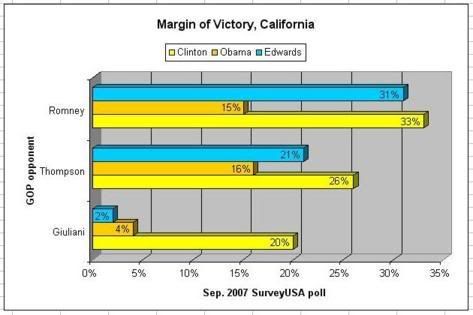

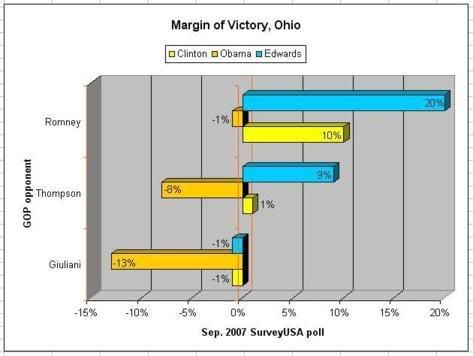
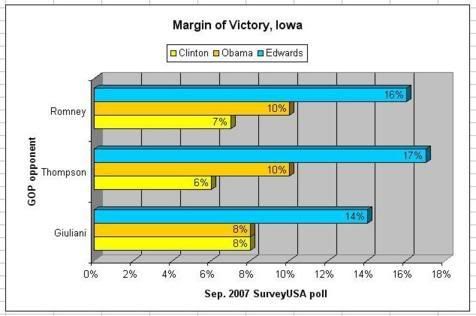
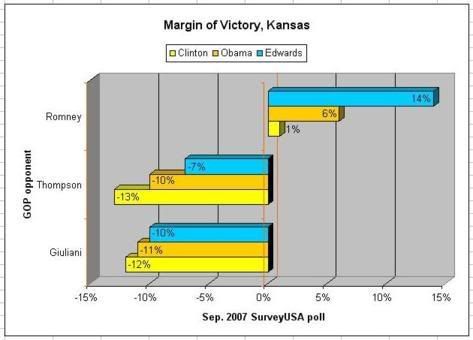
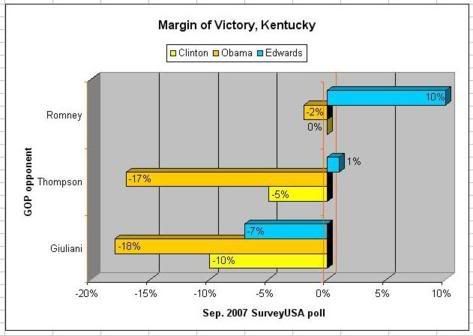
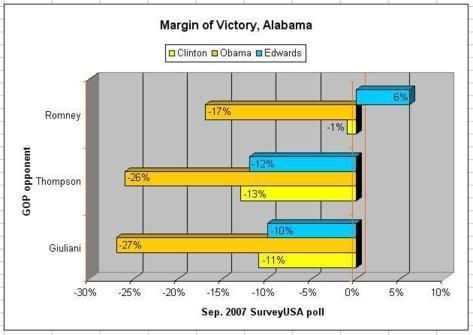
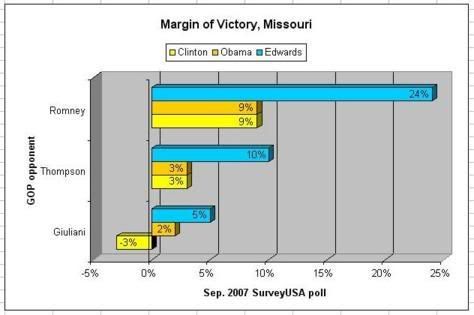
 "In December of 2005, when I filed to run for office, I made a promise to the hardworking families in our community to fight for our public schools, fight for affordable health care and to fight for them on pocketbook issues," Mr. England said in a statement. "After one session in the House, I found that the Republican leadership in Austin had no tolerance for the values and priorities of the folks I represent. That is why... I will announce my intention to seek re-election to the Texas House as a Democrat."
"In December of 2005, when I filed to run for office, I made a promise to the hardworking families in our community to fight for our public schools, fight for affordable health care and to fight for them on pocketbook issues," Mr. England said in a statement. "After one session in the House, I found that the Republican leadership in Austin had no tolerance for the values and priorities of the folks I represent. That is why... I will announce my intention to seek re-election to the Texas House as a Democrat."







 "Senator Hillary Clinton has earned the support of millions of Americans in her campaign for president -- and today I am pleased to count myself among them. The world has reached a critical point, and we need a leader in the White House with the courage, intelligence and humility to navigate through many troubling challenges to our security at home and abroad. I believe Senator Clinton is that leader, and I whole-heartedly endorse her for President of the United States. Senator Clinton and I share a worldview in which diplomacy is the best first-strike tool in our arsenal; in today's complicated global system, the United States should be making more friends than enemies."
"Senator Hillary Clinton has earned the support of millions of Americans in her campaign for president -- and today I am pleased to count myself among them. The world has reached a critical point, and we need a leader in the White House with the courage, intelligence and humility to navigate through many troubling challenges to our security at home and abroad. I believe Senator Clinton is that leader, and I whole-heartedly endorse her for President of the United States. Senator Clinton and I share a worldview in which diplomacy is the best first-strike tool in our arsenal; in today's complicated global system, the United States should be making more friends than enemies."
